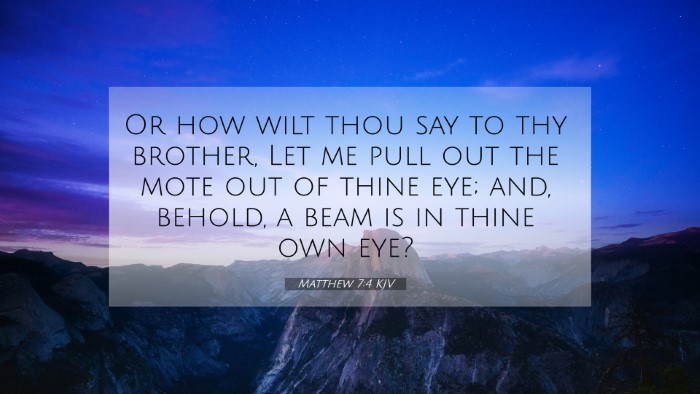Understanding Matthew 7:4
Bible Verse: "Or how wilt thou say to thy brother, Let me pull out the mote out of thine eye; and, behold, a beam is in thine own eye?" (Matthew 7:4, KJV)
Overview and Context
The verse Matthew 7:4 is part of the Sermon on the Mount, where Jesus addresses the judgment and hypocrisy seen in behavior toward others. It follows closely with the broader theme of discernment and the proper attitude when offering correction to others.
Key Insights
Insights drawn from the esteemed commentaries of Matthew Henry, Albert Barnes, and Adam Clarke reveal significant truths about this verse:
- Humility in Correction: All three commentators emphasize the necessity of self-examination before attempting to correct someone else. Matthew Henry notes that the 'beam'—a larger fault—often blinds us to the 'mote' in others.
- Self-Deception: Albert Barnes highlights the hypocritical nature of approaching others about their faults while ignoring our own. Acknowledging one's weaknesses is paramount for genuine reconciliation.
- Spiritual Blindness: Adam Clarke mentions that those who do not see their faults may misjudge the faults of others, leading to misunderstandings and unkind judgments.
- The Importance of Love: A corrective approach should be rooted in love rather than judgment. Each commentator suggests that the intent should be restoration, not condemnation.
Key Themes
This verse highlights several pivotal themes:
- Self-Reflection: Reflecting on one’s sins promotes genuine humility.
- Judgment and Mercy: Our judgment of others should be tempered with mercy, recognizing our fallibility.
- Relational Integrity: It is vital to maintain honest relationships, which begins with acknowledging our faults.
Cross-References
Matthew 7:4 is interconnected with several other scriptures that further illustrate its themes:
- Luke 6:41-42: "And why beholdest thou the mote that is in thy brother's eye, but perceivest not the beam that is in thine own eye?" This parallel passage reinforces the same lesson of self-examination.
- Galatians 6:1: "Brethren, if a man be overtaken in a fault, ye which are spiritual, restore such an one in the spirit of meekness; considering thyself, lest thou also be tempted." Here, Paul commends the approach of gentle correction coupled with self-awareness.
- James 4:12: "There is one lawgiver, who is able to save and to destroy: who art thou that judgest another?" This verse reiterates the importance of humility and recognizes God as the ultimate judge.
- Romans 2:1: "Therefore thou art inexcusable, O man, whosoever thou art that judgest: for wherein thou judgest another, thou condemnest thyself; for thou that judgest doest the same things." Paul cautions against hypocrisy in judgment.
- 1 Peter 5:5: "Likewise, ye younger, submit yourselves unto the elder. Yea, all of you be subject one to another, and be clothed with humility: for God resisteth the proud, and giveth grace to the humble." Peter emphasizes humility as essential in our dealings with one another.
- Matthew 5:7: "Blessed are the merciful: for they shall obtain mercy." Jesus closely aligns mercy with forgiveness and correction.
- John 8:7: "So when they continued asking him, he lifted up himself, and said unto them, He that is without sin among you, let him first cast a stone at her." This clarifies the principle of self-examination before condemning others.
- Proverbs 21:2: "Every way of a man is right in his own eyes: but the Lord pondereth the hearts." This speaks to the idea that human judgment may often be flawed.
- Matthew 23:24: "Ye blind guides, which strain at a gnat, and swallow a camel." This hyperbole illustrates the ridiculousness of focusing on minor faults while ignoring greater issues.
Application and Reflection
As the message of Matthew 7:4 penetrates our hearts, it challenges us to:
- Engage in Self-Reflection: Prioritize honesty with ourselves about our shortcomings.
- Approach Others with Compassion: When correcting, do so with love and humility.
- Foster Community: Build a culture of openness where mutual growth is encouraged rather than judgment.
Conclusion
The depth of Matthew 7:4 is enriched through scriptural cross-references. The connective tissue between the scriptures creates a comprehensive understanding of the themes of humility, judgment, and relational integrity. By engaging with these texts through tools like a Bible concordance or cross-reference guide, believers can foster a more profound understanding and application of the Biblical principles of correction and grace.


